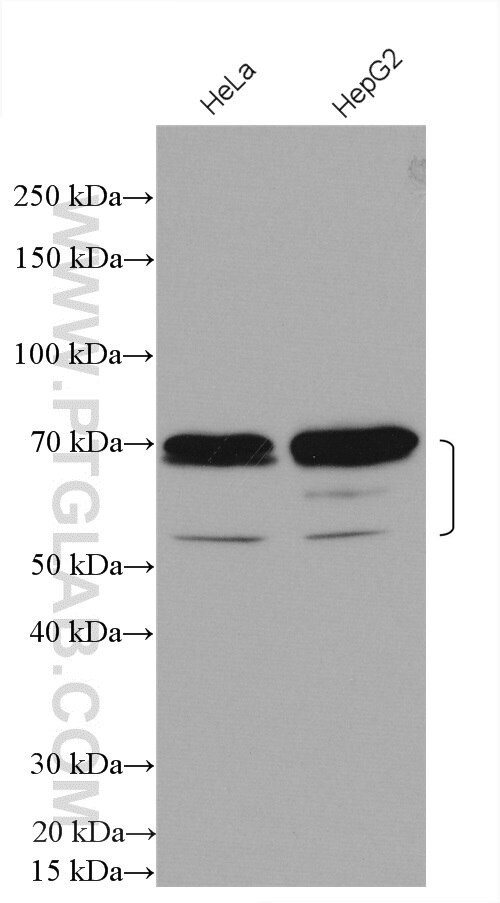Validation Data Gallery
Tested Applications
| Positive WB detected in | HepG2 cells, HeLa cells |
Recommended dilution
| Application | Dilution |
|---|---|
| Western Blot (WB) | WB : 1:500-1:2000 |
| It is recommended that this reagent should be titrated in each testing system to obtain optimal results. | |
| Sample-dependent, Check data in validation data gallery. | |
Product Information
28127-1-AP targets ZBTB7B in WB, ELISA applications and shows reactivity with Human, mouse samples.
| Tested Reactivity | Human, mouse |
| Host / Isotype | Rabbit / IgG |
| Class | Polyclonal |
| Type | Antibody |
| Immunogen | ZBTB7B fusion protein Ag27970 相同性解析による交差性が予測される生物種 |
| Full Name | zinc finger and BTB domain containing 7B |
| Calculated molecular weight | 539 aa, 58 kDa |
| Observed molecular weight | 70 kda |
| GenBank accession number | BC012070 |
| Gene Symbol | ZBTB7B |
| Gene ID (NCBI) | 51043 |
| RRID | AB_2881068 |
| Conjugate | Unconjugated |
| Form | Liquid |
| Purification Method | Antigen affinity purification |
| UNIPROT ID | O15156 |
| Storage Buffer | PBS with 0.02% sodium azide and 50% glycerol , pH 7.3 |
| Storage Conditions | Store at -20°C. Stable for one year after shipment. Aliquoting is unnecessary for -20oC storage. |
Background Information
ZBTB7B, also known as Zfp-67 or Zinc finger protein Th-POK, is a 539 amino acid protein, which localizes in nucleus. ZBTB7B as a transcription regulator that acts as a key regulator of lineage commitment of immature T-cell precursors. ZBTB7B is necessary and sufficient for commitment of CD4 lineage, while its absence causes CD8 commitment. The calcualted molecular weight of ZBTB7B is about 58 kDa, but modified protein is 70 kDa.
Protocols
| Product Specific Protocols | |
|---|---|
| WB protocol for ZBTB7B antibody 28127-1-AP | Download protocol |
| Standard Protocols | |
|---|---|
| Click here to view our Standard Protocols |
